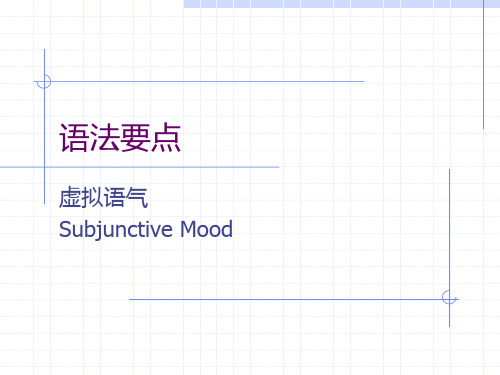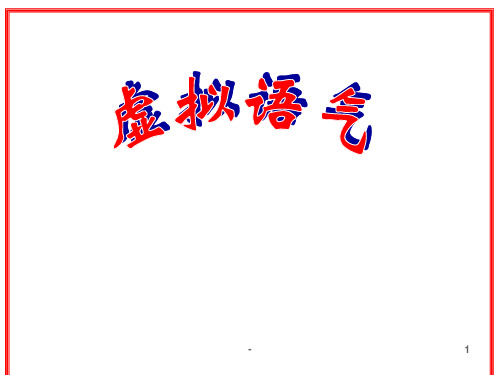虚拟语气公开课课件全
合集下载
虚拟语气公开课全PPT课件

将来虚拟语气
总结词
表示与将来事实相反的情况
详细描述
在从句中使用一般过去时或 “were to+动词原形”,主句中 使用“would+动词原形”,表示 与将来实际情况相反的情况,常 用于表达预测、期望等情感。
混合虚拟语气
总结词
表示与过去、现在或将来事实相反的 情况
详细描述
在从句和主句中分别使用不同的时间 点的虚拟语气形式,表示与过去、现 在或将来实际情况相反的情况,常用 于表达复杂的假设、期望等情感。
在定语从句和主句中的用法
在定语从句和主句中,虚拟语气也有特定的用法。在 定语从句中,虚拟语气通常用于修饰名词或代词,表 达对某种情况的假设或想象。
例如,“I have a dream that one day this nation will rise up and live out the true meaning of its creed: 'We hold these truths to be self-evident: that all men are created equal.'”(我有一个梦想 ,有一天这个国家会站起来并实现其信条的真正含义 :我们认为这些真理是不言而喻的:所有的人生来平 等。)在主句中,虚拟语气通常用于表达对某种情况 的祝愿或假设。
02
在省略句中,虚拟语气通常出现在被省略的部分,表示与实际情况相反的情况 或结果。
03
例如,“If he had known the answer, he would have told you.”这句话省 略了“he had known the answer”的部分,只保留了关键信息“he would have told you”,表示“如果他知道了答案,他会告诉你的”。
虚拟语气公开课全PPT课件

在倒装句中,虚拟语气也可以用来表示假设或条件。例如 ,“Had he not been late, he would have been promoted.”(如果他没迟到,他就被提拔了。)
04
虚拟语气的实际应用
在写作中的应用
写作中,虚拟语气可以用来表达假设 、条件、建议、意愿等,使句子更加 生动、有力。例如,“如果我是你, 我会选择这个选项。”
在翻译中的应用
在翻译过程中,虚拟语气可以用来保持原文的语气和情感色彩,使译文更加准确、传神。例如,在翻 译英文的虚拟语气时,可以将其翻译为中文的“要是”、“如果”、“假如”等词,以保持原文的语 气和含义。
虚拟语气在翻译中还可以用来处理一些难以理解的句子或表达方式,使其更加符合目标语言的习惯和 表达方式。例如,在翻译一些复杂的从句或长句时,可以使用虚拟语气来简化句式或突出重点。
虚拟语气公开课全ppt 课件
汇报人:可编辑
2023-12-23
目录 CONTENT
• 虚拟语气概述 • 虚拟语气的基本形式 • 虚拟语气的特殊形式 • 虚拟语气的实际应用 • 虚拟语气常见错误与纠正方法 • 虚拟语气练习与答案解析
01
虚拟语气概述
定义与特点
定义
虚拟语气是表示假设、想象、推 测等非真实情况的语气,常常用 于条件句、祝愿、建议等语境中 。
虚拟语气常见错误与纠 正方法
时态错误
总结词
时态错误是指虚拟语气在时态使用上的不准确,通常表现为混淆了虚拟语气与陈述语气 。
详细描述
在英语中,虚拟语气通常表示与事实相反的情况,如假设、想象、祝愿等,时态的使用 应与事实相反。例如,在"If I were you, I would do it"中,"were"和"would"构成了 虚拟语气,表示与事实相反的情况。如果混淆了虚拟语气和陈述语气,就会造成时态错
04
虚拟语气的实际应用
在写作中的应用
写作中,虚拟语气可以用来表达假设 、条件、建议、意愿等,使句子更加 生动、有力。例如,“如果我是你, 我会选择这个选项。”
在翻译中的应用
在翻译过程中,虚拟语气可以用来保持原文的语气和情感色彩,使译文更加准确、传神。例如,在翻 译英文的虚拟语气时,可以将其翻译为中文的“要是”、“如果”、“假如”等词,以保持原文的语 气和含义。
虚拟语气在翻译中还可以用来处理一些难以理解的句子或表达方式,使其更加符合目标语言的习惯和 表达方式。例如,在翻译一些复杂的从句或长句时,可以使用虚拟语气来简化句式或突出重点。
虚拟语气公开课全ppt 课件
汇报人:可编辑
2023-12-23
目录 CONTENT
• 虚拟语气概述 • 虚拟语气的基本形式 • 虚拟语气的特殊形式 • 虚拟语气的实际应用 • 虚拟语气常见错误与纠正方法 • 虚拟语气练习与答案解析
01
虚拟语气概述
定义与特点
定义
虚拟语气是表示假设、想象、推 测等非真实情况的语气,常常用 于条件句、祝愿、建议等语境中 。
虚拟语气常见错误与纠 正方法
时态错误
总结词
时态错误是指虚拟语气在时态使用上的不准确,通常表现为混淆了虚拟语气与陈述语气 。
详细描述
在英语中,虚拟语气通常表示与事实相反的情况,如假设、想象、祝愿等,时态的使用 应与事实相反。例如,在"If I were you, I would do it"中,"were"和"would"构成了 虚拟语气,表示与事实相反的情况。如果混淆了虚拟语气和陈述语气,就会造成时态错
虚拟语气公开课全PPT课件(模板)

表示与现在事实相反的情况,从 句用一般过去时,主句用 “would/should/could/might + 动词原形”
80%
例句
If I were you, I would study harder.(如果我是你,我会ቤተ መጻሕፍቲ ባይዱ努 力学习。)
过去时条件句虚拟语气
基本结构
If + 主语 + had + 过去分词, 主语 + would/should/could/might + have + 过去分词
03
情态动词的疑问句形 式错误
在构成疑问句时,应将情态动词放在 句首,而不是将助动词“do”放在句 首。例如,“你能来吗?”应表达为 “Can you come?”,而不是“Do you can come?”。
THANK YOU
感谢聆听
虚拟语气在从句中的运用技巧
名词性从句中虚拟语气使用规则
虚拟语气在主语从句中的应用
当主语从句表达的是与现在事实相反的情况时,谓语动词用一般过去时。
虚拟语气在宾语从句中的应用
当宾语从句表达的是与现在事实相反的情况时,谓语动词用一般过去时或过去完成时。
虚拟语气在表语从句和同位语从句中的应用
当这些从句表达的是与现在事实相反的情况时,谓语动词用一般过去时。
定语从句中虚拟语气使用规则
虚拟语气在定语从句中的应用:当定语从句表达的是与现在事实 相反的情况时,谓语动词用一般过去时或过去完成时。
需要注意的是,定语从句中的虚拟语气通常出现在“as if”或 “as though”引导的从句中。
状语从句中虚拟语气使用规则
虚拟语气在条件状语从句中的应用
当条件状语从句表达的是与现在事实相反的情况时,谓语动词用一般过去时或过去完成 时。
80%
例句
If I were you, I would study harder.(如果我是你,我会ቤተ መጻሕፍቲ ባይዱ努 力学习。)
过去时条件句虚拟语气
基本结构
If + 主语 + had + 过去分词, 主语 + would/should/could/might + have + 过去分词
03
情态动词的疑问句形 式错误
在构成疑问句时,应将情态动词放在 句首,而不是将助动词“do”放在句 首。例如,“你能来吗?”应表达为 “Can you come?”,而不是“Do you can come?”。
THANK YOU
感谢聆听
虚拟语气在从句中的运用技巧
名词性从句中虚拟语气使用规则
虚拟语气在主语从句中的应用
当主语从句表达的是与现在事实相反的情况时,谓语动词用一般过去时。
虚拟语气在宾语从句中的应用
当宾语从句表达的是与现在事实相反的情况时,谓语动词用一般过去时或过去完成时。
虚拟语气在表语从句和同位语从句中的应用
当这些从句表达的是与现在事实相反的情况时,谓语动词用一般过去时。
定语从句中虚拟语气使用规则
虚拟语气在定语从句中的应用:当定语从句表达的是与现在事实 相反的情况时,谓语动词用一般过去时或过去完成时。
需要注意的是,定语从句中的虚拟语气通常出现在“as if”或 “as though”引导的从句中。
状语从句中虚拟语气使用规则
虚拟语气在条件状语从句中的应用
当条件状语从句表达的是与现在事实相反的情况时,谓语动词用一般过去时或过去完成 时。
高中英语语法课件-虚拟语气(全)(共55张PPT)详解

实战练习 5
2001年1月大学英语四级题目: Some women a good salary in a job instead of staying home, but they decided not to work for the sake of the family. A. must make B. should have made C. would make D. could have made
解题思路
这是一道错综时间虚拟条件句。 在本句中,从句是对过去发生的事情进 行假设,主句是对现在情况的假设。 译文:当你掉下来时,如果不是我在梯 子下面把你接住,恐怕你现在就不会笑 了。选A
实战练习 2
If you had taken your medicine yesterday, you ___ well now. A. are B. had been C. would be D. were 正确答案: C
祈使语气主要用于祈使句。 e.g. Get out of here! 虚拟语气
II. 什么是虚拟语气?
虚拟语气是一种特殊的动词形式,表示说话人 所说的话不是事实,而是想象、假设、建议、 打算、意见、愿望、怀疑、推测、喜悦等等。 e.g. If we had met her last night, we would have told her what had happened. 如果我们昨晚见到她,我们就会告诉她发生了 什么事。 (实际上,我们并没有见到她,也没有告诉她 所发生的事。)
注意!!!
如果条件从句是否定式,倒装时只能把 not 放在主语之后,不能用缩写式把not 放在主语之前。 e.g. Had you not told me about the matter, I should never have known the whole thing. (不能说:Hadn’t you told me…)
虚拟语气-(共51张)PPT课件

A. Were B. should C. would D. will
-
18
If you had followed my advice, you would be
able to finish the work now. 如果你当时听了我的话,现在就能完成这份 工作了。 (从句说明过去,主句说明现在。)
时 间 If 条件句
主句
过去
现在
将来
-
10
一、一般条件句中的虚拟语气
时 间 If 条件句
主句
过去
had done
would should could might
+have done sth
现在
would
助动词 be用 were should 实义动词 do 用 did could
might
+ do sth
Without your help, we D____ such rapid progress.
A. couldn’t make B. wouldn’t make
C. will not have made D. wouldn’t have made
-
24
名词性从句中的虚拟句
-
25
宾语从句中的虚拟语气
句式一:wish后面宾语从句中的虚拟语气,表示
与事实相反的愿望。其表达形式一般是将从句的谓
语动词退后一个时态。例如:
1)与现在事实相反 : wish + (that)+did(were)
I wish I were as healthy as you.
A.could take B.would take
C.will have taken D.would- have taken
虚拟语气公开课全PPT课件

虚拟语气公开课全PPT课件
汇报人:
2023-12-22
目
CONTENCT
录
• 虚拟语气基本概念与分类 • 现在虚拟语气详解 • 过去虚拟语气详解 • 未来虚拟语气详解 • 混合时间虚拟语气详解 • 特殊句型中虚拟语气应用 • 总结回顾与拓展延伸
01
虚拟语气基本概念与分类
定义及作用
虚拟语气定义
虚拟语气是一种特殊的动词形式,用于表示与实际情况相反或不 太可能实现的假设、愿望、建议等。
注意事项和误区提示
注意区分虚拟语气和陈 述语气的使用场景,避 免混淆。
在使用虚拟语气时,要 确保主句和从句的时态 和语气保持一致。
注意虚拟语气中动词的 变化和省略形式的使用 。
避免在不需要使用虚拟 语气的场合误用虚拟语 气,导致表达不清或语 法错误。
03
过去虚拟语气详解
结构形式
基本结构
If + 主语 + had + 过去分词,主语 + would/should/could/might + have + 过去分词
省略形式
在特定的上下文或情景中,有时可省略从句中的主语和be动词,只保留were, had, should等词。
使用场景举例
条件状语从句
表示与现在事实相反的情况或假设,如“If I were you, I would accept the offer.”(如 果我是你,我会接受这个提议。)
宾语从句
省略形式
Had + 主语 + 过去分词,主语 + would/should/could/might + have + 过去分词
倒装形式
Had + 主语 + 过去分词,倒装部分(即把if省略, 把were, had, should提到句首)
汇报人:
2023-12-22
目
CONTENCT
录
• 虚拟语气基本概念与分类 • 现在虚拟语气详解 • 过去虚拟语气详解 • 未来虚拟语气详解 • 混合时间虚拟语气详解 • 特殊句型中虚拟语气应用 • 总结回顾与拓展延伸
01
虚拟语气基本概念与分类
定义及作用
虚拟语气定义
虚拟语气是一种特殊的动词形式,用于表示与实际情况相反或不 太可能实现的假设、愿望、建议等。
注意事项和误区提示
注意区分虚拟语气和陈 述语气的使用场景,避 免混淆。
在使用虚拟语气时,要 确保主句和从句的时态 和语气保持一致。
注意虚拟语气中动词的 变化和省略形式的使用 。
避免在不需要使用虚拟 语气的场合误用虚拟语 气,导致表达不清或语 法错误。
03
过去虚拟语气详解
结构形式
基本结构
If + 主语 + had + 过去分词,主语 + would/should/could/might + have + 过去分词
省略形式
在特定的上下文或情景中,有时可省略从句中的主语和be动词,只保留were, had, should等词。
使用场景举例
条件状语从句
表示与现在事实相反的情况或假设,如“If I were you, I would accept the offer.”(如 果我是你,我会接受这个提议。)
宾语从句
省略形式
Had + 主语 + 过去分词,主语 + would/should/could/might + have + 过去分词
倒装形式
Had + 主语 + 过去分词,倒装部分(即把if省略, 把were, had, should提到句首)
虚拟语气ppt课件完整版

02 03
例子
Had you come earlier, you would have met him.(= If you had come earlier, you would have met him.)(如果你早点来,你就能 见到他了。)
例子
Should it rain tomorrow, we would stay at home.(= If it should rain tomorrow, we would stay at home.)(如果明天下雨,我们就 呆在家里。)
虚拟语气用于强调句时,通常是通过 “It was ... that”结构对句子中的特 定成分进行强调。
在这种结构中,虚拟语气的使用与普 通虚拟语气略有不同,需要根据具体 情况进行判断。
虚拟语气与其他语法结构搭配使用
虚拟语气可以与定语从句、状语从句等语法结构搭配使用,表达更为复杂的语义关 系。
在这些结构中,虚拟语气的使用需要根据具体的语境和表达的语义关系进行判断。
真实条件句
表达现实中可能实现的情况, 使用陈述语气。
例子
If you study hard, you will pass the exam.(如果你努力 学习,你会通过考试。)
非真实条件句
表达与事实相反或不太可能实 现的情况,使用虚拟语气。
例子
If I were you, I would not do that.(如果我是你,我不会那
状语从句中虚拟语气使用
在if条件状语从句中
如果条件状语从句所表示的内容与实际情况相反或实现的可能性很小,则从句中的谓语动词常用虚拟语气。
在其他状语从句中
除了if条件状语从句外,还有一些其他状语从句也可以用虚拟语气,如:in order that(为了)、so that(以便 )等引导的目的状语从句中。这些从句中的谓语动词形式通常为“may/might/could/should + 动词原形”。
相关主题
- 1、下载文档前请自行甄别文档内容的完整性,平台不提供额外的编辑、内容补充、找答案等附加服务。
- 2、"仅部分预览"的文档,不可在线预览部分如存在完整性等问题,可反馈申请退款(可完整预览的文档不适用该条件!)。
- 3、如文档侵犯您的权益,请联系客服反馈,我们会尽快为您处理(人工客服工作时间:9:00-18:30)。
b.若条件从句为否定句,否定词not应 置于主语之后,而不能与were,should, had等缩略成weren’t,shouldn’t, hadn’t置于句首。
1). If I had seen him then, I would have been very happy.
= Had I seen him then, I would have been very happy.
虚拟语气
虚拟语气的概念
虚拟语气:虚拟语气表示说话人的愿望、假
设或建议,而不表示客观存在的事实(不是事实 或不大可能发生的事情)。 虚拟语气通过谓语动词的特殊形式来表示。
高考中虚拟语气的常考形式:
1. if 引导的虚拟条件句 2. 名词性从句 3. 固定句式 4. 情态动词表示虚拟 5. 可用可不用虚拟语气的情况
三个建议,四个要求。 suggest
2. It is(necessary,strange…)+that… 1.过去式
1. wish/as if
2.过去完成
3.could、would、might +v
2. Would rather/ if only
1.过去式 2.过去完成
类似if型 3. It is (high) time that…
主语+would (
should / might / could )+动词原 形
If+主语+had +动词的过 主语 + would (
去分词
should / might /
即:If+过去完成时态 could )+have
done
1、If+主语+动词过去式 2、If+主语+were to+ 动词 原形
If I get up early, I will catch the train.
If I had got up earlier , I could have caught the train.
a. if真实条件句 表示条件是真的或 有可能实现的, 采用陈述语气。
b. if虚拟条件句表示对事实的相反的 假设,或是虚拟的或几乎无法实现的 , 采用虚拟语气。
与过去事实相反
If the foreigner had learnt how to swim, he would not have been trapped on the island for four years.
2.虚拟条件句中的倒装
a.在虚拟条件句中,如果条件句中有 were, had(助动词)或should时,可 使用倒装结构, were, had,或should 可 提前,if省略。
3、If+主语+should +动词原 形
主语+would (
should / might / could )+动词原 形
If 型
。。。 。。。 。。。
混杂条件句(各自为准) Were, had ,should提前,省略if
Subjective mood
1. 一个坚持,两个命令, insist
Should +v型
2). If I should have time, I would go with you. = Should I have time, I would go with you. 3). If I were not so busy, I would go with you. = Were I not so busy, I would go with you.
与现在事实相反
If I were the schoolmaster , I would let the students get up a little later.
schoolmaster
if虚拟条件句 if虚拟条件句
主句
与将来 事实相 反的假 设
1、did 2、were to+ 动原 3、should +动原
would ( should / might / could )+动原
与 将 来 事 实 相 反
If I met Obama some day, I would shake hands with him.
If I were to meet Obama some day, … If I should meet Obama some day, …
if虚拟条件句 if虚拟条件句
与过去 事实相 反的假 设
had +done
主句
would ( should / might / could ) +have done
与过去事实相反
If the boy had driven more carefully, he would not have caused the car accident.
Should(不省) +v/ 过去式
4. But for/otherwise/ without/in that case
1.Would,could,should,might+v
2.would,could,should,might
+have done
Period Four Grammar:Subjunctive (1)
1. if 引导的虚拟条件句
①与现在事实相反 ②与将来事实可能相反 ③与过去事实相反
if虚拟条件句 if虚拟条件句
主句
Hale Waihona Puke 与现在 事实相did
反设的假(be动词用were)
would( should
/ might / could )+动原
与现在事实相反
If I had a great deal of money now, I would buy a big house for my parents.
虚拟语气(1) 动词的语气表示说话人的态度和看法,可分 为陈述语气、祈使语气和虚拟语气。陈述语气 用来陈述讲话人认为是事实的事情,有肯定、 否定、疑问和感叹等形式。祈使语气用来说明 说话人的请求、命令等。虚拟语气表示说话人 的愿望、假设或建议,而不表示客观存在的事 实。虚拟语气通过谓语动词的特殊形式来表 示。
语气
英语的动词一般可带有三种不同的语气: 陈述语气,祈使语气和虚拟语气。不同 的语气用动词的不同形式(有的还借助 句法形式)来表示。
与现在 事实相 反的假 设
与过去 事实相 反的假 设
与将来 事实相 反的假 设
if虚拟条件句
主句
If+主语+ 动词的过去式 (be动词一般用were)
即:If+一般过去时态 (be动词一般用were)
1). If I had seen him then, I would have been very happy.
= Had I seen him then, I would have been very happy.
虚拟语气
虚拟语气的概念
虚拟语气:虚拟语气表示说话人的愿望、假
设或建议,而不表示客观存在的事实(不是事实 或不大可能发生的事情)。 虚拟语气通过谓语动词的特殊形式来表示。
高考中虚拟语气的常考形式:
1. if 引导的虚拟条件句 2. 名词性从句 3. 固定句式 4. 情态动词表示虚拟 5. 可用可不用虚拟语气的情况
三个建议,四个要求。 suggest
2. It is(necessary,strange…)+that… 1.过去式
1. wish/as if
2.过去完成
3.could、would、might +v
2. Would rather/ if only
1.过去式 2.过去完成
类似if型 3. It is (high) time that…
主语+would (
should / might / could )+动词原 形
If+主语+had +动词的过 主语 + would (
去分词
should / might /
即:If+过去完成时态 could )+have
done
1、If+主语+动词过去式 2、If+主语+were to+ 动词 原形
If I get up early, I will catch the train.
If I had got up earlier , I could have caught the train.
a. if真实条件句 表示条件是真的或 有可能实现的, 采用陈述语气。
b. if虚拟条件句表示对事实的相反的 假设,或是虚拟的或几乎无法实现的 , 采用虚拟语气。
与过去事实相反
If the foreigner had learnt how to swim, he would not have been trapped on the island for four years.
2.虚拟条件句中的倒装
a.在虚拟条件句中,如果条件句中有 were, had(助动词)或should时,可 使用倒装结构, were, had,或should 可 提前,if省略。
3、If+主语+should +动词原 形
主语+would (
should / might / could )+动词原 形
If 型
。。。 。。。 。。。
混杂条件句(各自为准) Were, had ,should提前,省略if
Subjective mood
1. 一个坚持,两个命令, insist
Should +v型
2). If I should have time, I would go with you. = Should I have time, I would go with you. 3). If I were not so busy, I would go with you. = Were I not so busy, I would go with you.
与现在事实相反
If I were the schoolmaster , I would let the students get up a little later.
schoolmaster
if虚拟条件句 if虚拟条件句
主句
与将来 事实相 反的假 设
1、did 2、were to+ 动原 3、should +动原
would ( should / might / could )+动原
与 将 来 事 实 相 反
If I met Obama some day, I would shake hands with him.
If I were to meet Obama some day, … If I should meet Obama some day, …
if虚拟条件句 if虚拟条件句
与过去 事实相 反的假 设
had +done
主句
would ( should / might / could ) +have done
与过去事实相反
If the boy had driven more carefully, he would not have caused the car accident.
Should(不省) +v/ 过去式
4. But for/otherwise/ without/in that case
1.Would,could,should,might+v
2.would,could,should,might
+have done
Period Four Grammar:Subjunctive (1)
1. if 引导的虚拟条件句
①与现在事实相反 ②与将来事实可能相反 ③与过去事实相反
if虚拟条件句 if虚拟条件句
主句
Hale Waihona Puke 与现在 事实相did
反设的假(be动词用were)
would( should
/ might / could )+动原
与现在事实相反
If I had a great deal of money now, I would buy a big house for my parents.
虚拟语气(1) 动词的语气表示说话人的态度和看法,可分 为陈述语气、祈使语气和虚拟语气。陈述语气 用来陈述讲话人认为是事实的事情,有肯定、 否定、疑问和感叹等形式。祈使语气用来说明 说话人的请求、命令等。虚拟语气表示说话人 的愿望、假设或建议,而不表示客观存在的事 实。虚拟语气通过谓语动词的特殊形式来表 示。
语气
英语的动词一般可带有三种不同的语气: 陈述语气,祈使语气和虚拟语气。不同 的语气用动词的不同形式(有的还借助 句法形式)来表示。
与现在 事实相 反的假 设
与过去 事实相 反的假 设
与将来 事实相 反的假 设
if虚拟条件句
主句
If+主语+ 动词的过去式 (be动词一般用were)
即:If+一般过去时态 (be动词一般用were)
